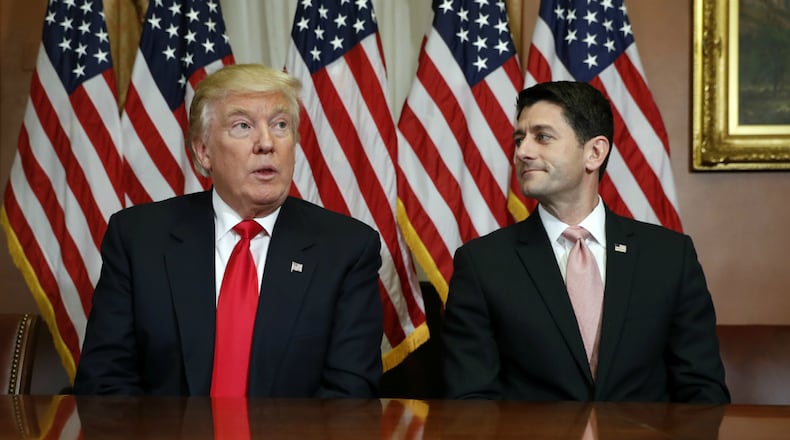We are told by Speaker Ryan and Sec. Price that the ACA (Obamacare) is the root of all evil in the health system. I agree with some of their criticisms.
At the time it was passed, I was published in several national newspapers stating that there were going to be cost containment and coverage issues with the ACA. I was proven correct.
The most obvious solution to our healthcare crisis, single payer as practiced in Canada and various European nations, was never considered by Obama and the Democratic leadership. Obama (like Trump) believed in expansion of Medicare to cover all (single payer) and endorsed it before he was elected.
But, he ultimately decided that Romneycare (based on an idea conceived by the ultra-conservative Heritage Foundation as an alternative to Hillarycare in the 1990s) should be converted into Obamacare.
He figured that since it was in large part a Republican free enterprise solution, using private insurance companies to expand coverage for the middle class via subsidies, he would get GOP support. Mitch McConnell, the ultimate old-time politician, made sure that did not happen.
Still, an additional 20 million people got coverage, half via subsidies and the mandate provisions. The other half received coverage due to Medicaid expansion.
Expansion was originally mandated via a poison pill in the ACA. In a Solomon like “split the baby” decision, the Roberts U.S. Supreme Court found the ACA to be constitutional, but Medicaid expansion was made voluntary for states. Thus, even with 90 percent long-term federal funding, 19 GOP-dominated states chose not to expand.
Over the last two Obama terms, the GOP House passed repeal bills over 60 times. Although there was no consensus GOP replacement plan, both Speaker Ryan and then Rep. Price (now HHS Sec. Price) developed detailed proposals.
The election of Donald Trump took everyone, including the GOP Congress, by surprise. Trump told the American people that “everyone will have insurance”. So, how should Price and Ryan achieve this elusive goal while preserving their free market ideas?
The result was the American Health Care Act (AHCA), which simply builds on Ryan’s ideas and the Price health reform bill he once introduced in the House. The problem is that it does not provide coverage for all Americans, per Trump’s campaign promise.
Instead, Ryan and Price have chosen to engage in disreputable double-talk, referring to full “access,” not coverage.
I have been in healthcare since 1976. Achieving access has always meant provision of comprehensive health insurance coverage.
The new Ryan-Price definition ignores financial aspects of affordability. The AHCA also eliminates minimum benefits requirements, so coverage can be very meager. For example, mental health might be left out.
We have had full access to health insurance plans for the last century. The problem has always been premiums, affordability and the specifics as to what exactly was covered.
The Congressional Budget Office (CBO) has confirmed this fact, stating that by 2026 we will have another 24 million people uninsured. We will be in worse shape than we were pre-Obamacare.
Despite protestations by the White House, it is obvious as to why. The mandate is lifted, so healthier people will opt out and leave only the sicker people with insurance.
These sicker folks will pay premiums that are capped at 5 times what they are for the healthier folks. Further, subsidies are slashed dramatically so that the middle-class people now on the ACA can’t afford to pay these premiums.
And, then there is the Medicaid fiasco. The GOP wants to install a per-enrollee payment to states, with a cap beginning in 2020. The result will be many potential enrollees not joining the program and existing enrollees thrown off Medicaid due to “churning” (leaving Medicaid and then not being allowed to come back).
If all this sounds complicated, it is. The GOP criticized the complexity of the ACA, and then came up with an even more complex scheme. Maybe this is why Gallup has found that public support for the ACA has suddenly risen.
On top of all of this, there is the funding issue. CBO states that the AHCA will reduce the deficit by $337 billion over the 2017-2026 periods. Sounds fine, but the key is how.
Expense reduction is achieved primarily via:
a.) eliminating subsidies to the needy to purchase insurance, and ...
b.) cutting Medicaid by dumping the issue onto the states.
Revenues are also reduced. Eliminated are the surtax on investment income and the Hospital Insurance payroll tax, which applied only to families making over $250,000.
Thus, the ACHA represents a $600 million tax cut for the wealthiest Americans. That amounts to $200,000 each for the wealthiest 0.1 percent of our citizens.
There is a reason that many more practical GOP politicians are running away from the AHCA. If Trump is the bright businessman he claims to be, he will soon be running away as well.
Jack Bernard, the first director of health planning for Georgia, has been an executive with several national health care firms. A Republican, he's a former chairman of the Jasper County Commission.
About the Author
Keep Reading
The Latest
Featured


